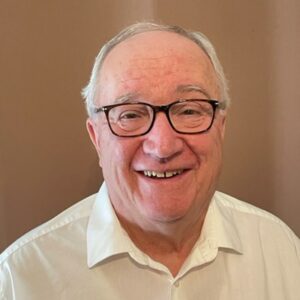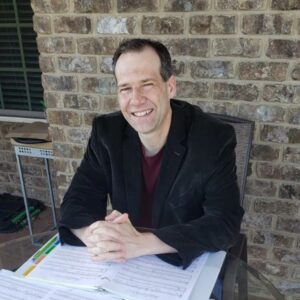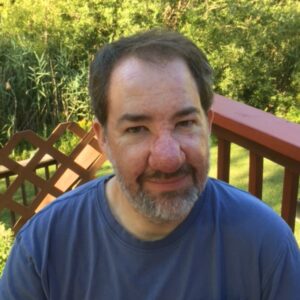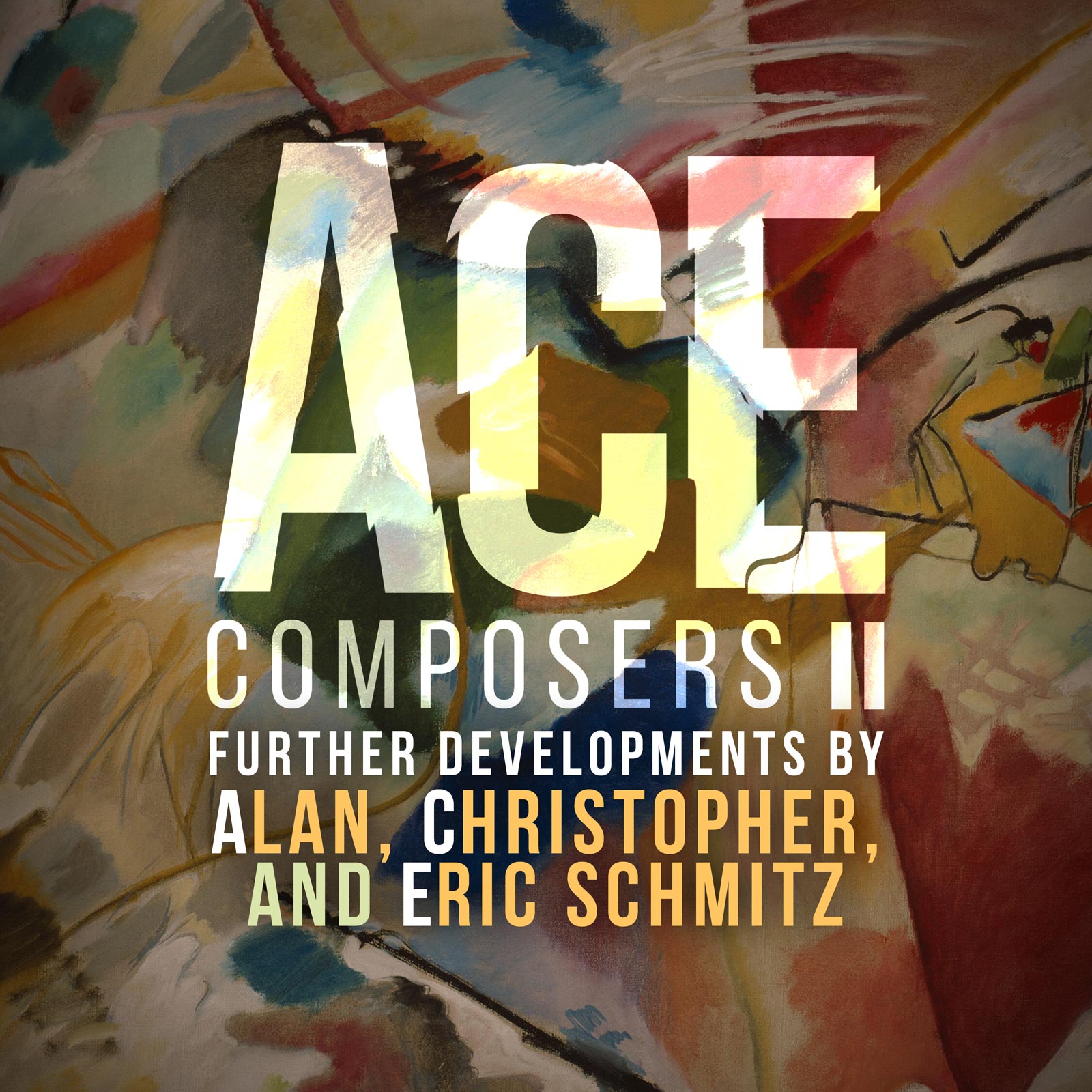Ace Composers II
Alan Schmitz composer
Christopher Schmitz composer
Eric Schmitz composer
While it isn’t entirely unusual for musicians to raise musical children, it is fairly rare for a composer to have not one, but two sons who also compose. This is the case for composition professor Alan Schmitz, who, together with his sons Christopher and Eric, presents of ACE COMPOSERS II, a curated selection of contemporary chamber music which proves that the apple sometimes does fall further from the tree, at least in some regards. It would be impossible to mistake either one’s works for that of any of the others: too distinct are the individual idiosyncrasies – the swooping, late-Romantic phrases, the sober, experimental minimalism, and the jazzy groove. Nevertheless, they are all united by one commonality – aesthetic appeal seems to run in the family.
Listen
Stream/Buy
Choose your platform
Track Listing & Credits
| # | Title | Composer | Performer | |
|---|---|---|---|---|
| 01 | Romanza | Christopher Schmitz | Amy Schwartz Moretti, violin; Elizabeth Pridgen, piano | 8:42 |
| 02 | Bass Trombone Sonata (“Call of the Opera”): I. Allegro | Christopher Schmitz | Denson Paul Pollard, bass trombone; Kimberly Carballo, piano | 6:44 |
| 03 | Bass Trombone Sonata (“Call of the Opera”): II. Arioso | Christopher Schmitz | Denson Paul Pollard, bass trombone; Kimberly Carballo, piano | 5:14 |
| 04 | Bass Trombone Sonata (“Call of the Opera”): III. Vivace | Christopher Schmitz | Denson Paul Pollard, bass trombone; Kimberly Carballo, piano | 4:05 |
| 05 | Evening Prayer | Alan Schmitz | Stanley Roberts, conductor, director; Alexis Lundy, soprano; Mary Grace Roark, alto; Richard Kosowski, tenor I; Clay Young, tenor II; Stanley Roberts, baritone; Cameron Rolling, bass | 4:56 |
| 06 | Opening Flourish | Alan Schmitz | Emily Schmitz Madonia, violin | 1:42 |
| 07 | Rock Dance (Cello Sketch III) | Alan Schmitz | Craig Hultgren, cello | 3:59 |
| 08 | Poeme Nocturne | Alan Schmitz | Emily Schmitz Madonia, violin; Lee Schmitz, piano | 8:46 |
| 09 | Introduction and Domestic Squabble | Eric Schmitz | Charles Pillow, alto saxophone, English horn | 7:10 |
| 10 | Ballad Melody and Variations: I. Ballad | Eric Schmitz | Robert Auler, piano | 0:52 |
| 11 | Ballad Melody and Variations: II. Jazz Ballad | Eric Schmitz | Robert Auler, piano | 1:07 |
| 12 | Ballad Melody and Variations: III. Arvo Pärt-like | Eric Schmitz | Robert Auler, piano | 1:39 |
| 13 | Ballad Melody and Variations: IV. Block Chords | Eric Schmitz | Robert Auler, piano | 0:58 |
| 14 | Ballad Melody and Variations: V. Fugue(ish) | Eric Schmitz | Robert Auler, piano | 1:00 |
| 15 | Ballad Melody and Variations: VI. Harp-like | Eric Schmitz | Robert Auler, piano | 0:56 |
| 16 | Ballad Melody and Variations: VII. Romantic and Grandiose | Eric Schmitz | Robert Auler, piano | 1:09 |
| 17 | The Lamplighter | Eric Schmitz | Christopher Merz, tenor saxophone solo; Bob Washut, piano; Josh Hakanson, drums; University of Northern Iowa Jazz Band One | Christopher Merz, director; Eric Schmitz, guest conductor; Tyler Utter, Jax Barry - alto saxophone; Johnny Hartleip, Kyle Punt - tenor saxophone; Logan Neifert, baritone saxophone; James Mons, Ben Thessen, Riley Jermier, Morgan Eadie, Kelley Meinen - trumpet; Justin Hughes, Levi Temple, Maggie Cremers - trombone; Jacob Chaplin, bass trombone; Luke Sanders, guitar; Sam Stover, electric bass; Michael Gedden, voice | 11:19 |
The ACE COMPOSERS II recording is dedicated to Dana Lee Geren Schmitz, wife of Alan, and mother of Christopher, Eric, Lee, and Emily.💘
Bass Trombone Sonata (“Call of the Opera”)
Recorded February 15, 2020 at Ford Hall, Jacobs School of Music, Indiana University in Bloomington IN
Producer Denson Paul Pollard
Engineer Stefan Wiebe
Romanza
Recorded February 17, 2022 at Neva Langley Fickling Hall, Townsend School of Music, Mercer University in Macon GA
Producer & Engineer Steve Moretti
Evening Prayer
Recorded December 11, 2020 at Neva Langley Fickling Hall, Townsend School of Music, Mercer University in Macon GA
Producer Christopher Schmitz
Engineer & Editing Steve Moretti
Opening Flourish, Poeme Nocturne
Recorded December 30, 2019 at Wire Road Studios in Houston TX
Producer & Engineer Andy Bradley
Operations Manager William Wade
Rock Dance (Cello Sketch III)
Recorded November 11, 2019 at Catamount Studios in Cedar Falls IA
Producer Craig Holtgren
Engineer Travis Huisman
Introduction and Domestic Squabble
Recorded May 12, 2021 at Blackdog Recording Studios in Rochester NY
Session Producer Eric Schmitz
Recording & Mixing Engineer Robert Blackburn
Ballad Melody and Variations
Recorded May 11, 2022 at Tyler Hall, State University of New York at Oswego in Oswego NY
Session Producer Eric Schmitz
Recording & Mixing Engineer Daniel Wood
The Lamplighter
Recorded November 15, 2021 at The Jazz Studio, Russell Hall, University of Northern Iowa in Cedar Falls IA
Session Producer Eric Schmitz
Recording & Mixing Engineer Tom Barry
Mastering Melanie Montgomery
Executive Producer Bob Lord
A&R Director Brandon MacNeil
A&R Danielle Lewis
VP of Production Jan Košulič
Audio Director Lucas Paquette
VP, Design & Marketing Brett Picknell
Art Director Ryan Harrison
Design Edward A. Fleming, Morgan Hauber
Publicity Patrick Niland, Aidan Curran
Artist Information

Alan Schmitz
Alan Schmitz (b. 1950) is Emeritus Professor of Theory and Composition at the University of Northern Iowa’s School of Music. He earned bachelor and master of music degrees from the University of New Mexico and a Ph.D. in music theory/composition from Rutgers University. Schmitz has received awards, commissions, and grants for composition from several agencies including the Alaska Council of the Arts, the Iowa Arts Council, the University of Northern Iowa, and the Lila Wallace/Reader’s Digest Foundation. His music appears on numerous Ravello Records releases, including NINETIES TIMEFLOW (chamber pieces), LYRIC IMAGES (guitar works performed by Todd Seelye), and ACE COMPOSERS, 21st Century Music by Alan, Christopher, and Eric Schmitz. Schmitz retired from the University of Northern Iowa in June, 2017, after 23 years as Associate Director of the School of Music and now resides in the Houston TX area.

Christopher Schmitz
Christopher Alan Schmitz (b. 1972) is Professor of Theory and Composition at the Townsend School of Music, Mercer University. His solo, chamber, and ensemble works are performed internationally and recorded on Navona Records and Beauport Classical. Scores are published and distributed by C. Alan Publications, Cimarron Press, Opus Music Publishers, and Cherry Classics.

Eric Schmitz
Eric Schmitz (b. 1977) is Professor of Jazz Studies at SUNY Oswego, where he directs the Oswego State Jazz Ensemble and Latin Jazz Ensemble, co-leads and performs with the Oswego Jazz Project (faculty jazz quartet), and teaches jazz and rock history, improvisation, jazz arranging, and music theory and composition.

